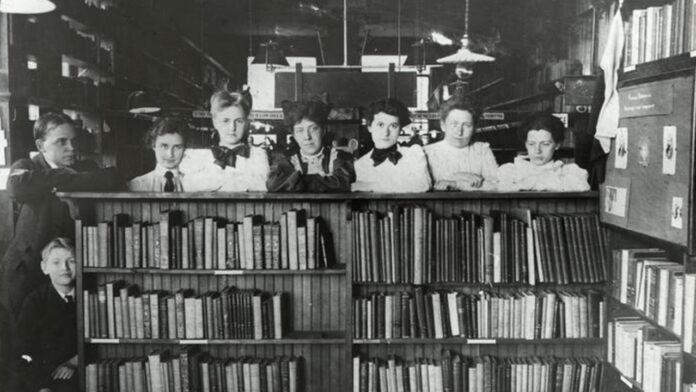Now may be the winter of our discontent—and probably not the last—but there’s a bright spot this weekend in the form of the Jewish Film Institute’s 12th Annual WinterFest. Taking over SF’s Vogue Theater for two days, Sat/22-Sun/23, it offers a diverse stopgap while you’re waiting for the much-larger summertime Jewish Film Fest, with documentaries, narratives and a panel discussion.
The nonfiction features examine matters of cultural import, their roots and often controversial lingering impact. Dawn Logsdon & Lucie Faulknor’s Free for All: The Public Library traces that all-important institution’s US history from philanthropist/industrialist Andrew Carnegie’s building spree (including seven extant neighborhood branches in SF) to the key role of libraries, literacy and education in general in various civil rights movements… on up to today’s rise in conservative book bans and even flat-out library closures.
Tatyana Tenebaum’s Everything You Have Is Yours finds choreographer Hadar Ahuvia examining the origins of “Israeli folk dances” that turn out to have many sources—including seldom-acknowledged borrowings from Palestinian and Arabic traditions. Yair Qedar’s Outsider. Freud is a brisk yet complex overview of the fabled psychonanalysis founder’s figure’s life and work, deploying archival materials, latterday interviews, animation, and more. Despite (or perhaps in part because of) his fame, he ended life forced to flee his native Austria for England amidst Nazi persecution of Jews like himself.
Family ties are a blessing and a burden in two very different narrative presentations. In Most People Die On Sundays, heavy-set, morose David (writer-director Iair Said) returns from studies in Europe—where a boyfriend just dumped him—to Buenos Aires for a relative’s funeral. He’s a sad-sack trainwreck in a deadpan cringe comedy where everyone is a bit adrift. By contrast, multiple generations of The Zweiflers in this acclaimed German TV series are all high drama, their many-hued dysfunctionality lusty and energetic. It’s a juicy, high-end soap opera whose first three episodes will surely leave you hungry for more.
Those 150 minutes end Winterfest on Sunday night, but earlier that afternoon, filmmakers and other guests will participate in “Creative Interventions: The Role of Art in Healing Political Division,” a panel discussion more timely than ever at present. For full program, schedule and ticket info on WinterFest 2025, go here.
Other notable screen events and arrivals this week:
Pump Up The Balboa: Some Revivals
Rebellious youth stick it to The Man in several choice revivals at the Outer Richmond’s venerable venue. First up, on Fri/21 Movies for Maniacs presents a double bill (more info here) of rock subversion commencing with Allan Moyle’s 1990 Pump Up the Volume, with Christian Slater as a new kid in a boring suburb who channels his angst into pirate radio broadcasts. One of the best-regarded teen movies of its era, it’s also among the few to boast a soundtrack just as cool as it thinks it is, featuring The Pixies, Sonic Youth, Bad Brains, Soundgarden, Leonard Cohen, Richard Hell, Descendants, Ice-T, Beastie Boys et al.
Lesser-known is the 1986 Trick or Treat, probably the best of several horror movies exploiting the Reagan era’s “Satanic Panic” bred by simultaneous explosions of heavy metal, televangelism and MTV. The very hyper Marc Price plays a picked-on teen headbanger whose worship of androgynous superstar Sammi Curr (former Solid Gold dancer Tony Fields) pays dividends when the newly-deceased latter’s spirit wreaks vengeance on his bullies. But of course things soon get lethally out of hand. The first film directed by American Graffiti actor Charlie Martin Smith, with glorified cameos from Gene Simmons and Ozzy Osbourne, it’s a lively and polished mix of Carrie and Phantom of the Paradise.
On Tue/25, Gallery 3630 presents Nic Hill’s 2005 Piece by Piece (more info here), an excellent documentary overview of graffiti culture in the San Francisco Bay Area, which may not have pioneered the form but is considered by some “the style capital of the US” Spanning twenty years’ history, it encompasses not just various star (if pseudononymous) artists, but the vogue for “subterranean art galleries” in quake-damaged buildings, the impact of felony law Prop. 21, and more. An audio as well as visual delight, it soundtracks cuts from DJ Qbert, People Under the Stairs, Kid 606, D-Styles, and so forth.
Universal Language
Taking place in a “surreal interzone somewhere between Tehran and Winnipeg,” this second feature from Matthew Rankin means to outdo his fellow native Winnipegger Guy Maddin in willful eccentricity. Among the protagonists whose paths eventually interweave in a snowy city where nearly everyone speaks Persian are two children determined to pry a banknote from a frozen sidewalk; a government employee who travels from Montreal for his mother’s 76th birthday; and a tour guide to exceptionally boring local sites.
The self-conscious non-sequiturs on tap also encompass a neighborhood called “The Beige District,” a live turkey with a bus ticket; figure skating to zither music; collections of bottled tears; community banners saying things like “A Strong Economy Helps Prevent Feelings Of Worthlessness”; and a grade school teacher so ill-tempered, he dismisses his class early with “You are all expelled! No more education!”
The handsome, skewed aesthetics here sometimes echo that of veteran Swedish absurdist Roy Andersson, while the comingled archness and pathos recalls Finn Aki Kaurismaki. Language (which opens at SF’s Roxie Fri/21) is a considerable leap from Rankin’s prior The Twentieth Century, which was likewise prankish and inventive but often more juvenile in humor. It’s gotten enthusiastic reviews, but I’m still not quite sold on this writer-director’s sensibility, which seems to beg indulgent applause for a quirkiness that is never quite as clever or funny as we’re meant to find it.





